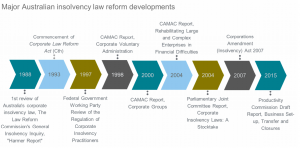8 June, 2015
The Productivity Commission has revived the idea of providing directors with a safe harbour from liability for insolvent trading. Such a change may assist directors in steering companies through financial difficulty.
(Click to enlarge)
An issue that has held a prominent place in the insolvency law reform agenda is the need for directors to have a safe harbour against the threat of liability for insolvent trading. The debate on this topic has reignited with a draft recommendation in the Productivity Commission Draft Report Business Set up, Transfer and Closure, released in May 2015.
The Australian reported last Thursday 28 May, 2015 that Small Business Minister Bruce Billson has backed the Commission's draft recommendation.
Under the current law, directors who trade whilst the company is insolvent could be liable to compensate creditors and, if found to have acted dishonestly, commit an offence.
Draft Recommendations From The Productivity Commission
The Commission has proposed the following regime for enabling directors to undertake restructuring activities without liability for insolvent trading:
- directors receive advice from registered advisers
- those advisers are disqualified from acting as administrators, receivers or liquidators in any subsequent insolvency process for the company
- the company informs ASIC and (if listed) the ASX of the appointment of the adviser
- directors would be under a duty to exercise their business judgment in the best interests of the company's creditors as a whole, as well as the company's members
- the director's duty not to trade while insolvent would be satisfied during the period of advice.
The draft report also proposes that independent advisers who see that insolvency has occurred, or is about to occur, be required to inform directors and creditors of this, so that a liquidation process can be initiated. From this point, the safe harbour protection would cease.
2010 Treasury Proposals
Earlier proposals for a safe harbour were contained in a 2010 Treasury paper A safe harbour to protect directors against liability for insolvent trading. One of Treasury's proposals is echoed in the recent Productivity Commission recommendation for protection of directors who act on appropriate advice. Treasury's proposal included, amongst other things, that the director be informed by restructuring advice from an appropriately experienced and qualified professional as to the feasibility of and means for ensuring that the company remains solvent, or that it is returned to a state of solvency within a reasonable period of time.
Both the Productivity Commission proposal and that in the Treasury paper leave open certain questions about the relevant advisers, for instance, who would be qualified to act as an adviser and what type of liabilities advisers might themselves incur.
Comparison Of Australian And UK approaches
It is interesting to compare the Australian proposals with the approach in the United Kingdom. There, the equivalent of insolvent trading is known as wrongful trading. A person can be found guilty of wrongful trading where, amongst other things:
- at some time before the commencement of the winding up, that person knew or ought to have concluded that there was no reasonable prospect that the company would avoid going into insolvent liquidation; and
- that person failed to take every step with a view to minimising the potential loss to the company’s creditors.
The way in which the UK wrongful trading prohibition is framed allows a director in appropriate circumstances to explore options that could rescue the company's business even if the company is insolvent, so long as the director has not concluded that liquidation is inevitable. This allows directors to pursue a rescue or restructure plan. Also, the director's liability is effectively limited to the net loss suffered by the company.
A key difference between the UK approach and the proposed Australian "safe harbour" approach is that the UK provision focuses on the director making a judgment, whilst the Australian proposal overlays that with an express requirement for directors to act on advice from appropriately qualified advisers. The UK and the Australian proposals both include an "all bets are off" approach when directors determine or are advised that the company cannot avoid insolvency. However, the Productivity Commission's recommendation seems the more stringent, in that the safe harbour protection ends as soon as directors are advised that insolvency has occurred or is about to occur, perhaps leaving no room to restructure through the period of insolvency. The resurgence of interest in reforming Australia's insolvent trading laws is a welcome development and could assist to avoid premature insolvency appointments and instead allow directors to pursue a successful turnaround. However, the precise form of protection for directors who are attempting a corporate restructuring is a matter that requires further deliberation.
For further information please contact:
Emanuel Poulos, Partner, Ashurst
emanuel.poulos@ashurst.com
Tony Ryan, Partner, Ashurst
tony.ryan@ashurst.com
James Marshall, Partner, Ashurst
james.marshall@ashurst.com
Joseph Scarcella, Partner, Ashurst
joseph.scarcella@ashurst.com
Timothy Sackar, Partner, Ashurst
timothy.sackar@ashurst.com
Tim Klineberg, Partner, Ashurst
tim.klineberg@ashurst.com
Ross McClymont, Partner, Ashurst
ross.mcclymont@ashurst.com
Michael Sloan, Partner, Ashurst
michael.sloan@ashurst.com
Lionel Meehan, Partner, Ashurst
lionel.meehan@ashurst.com






